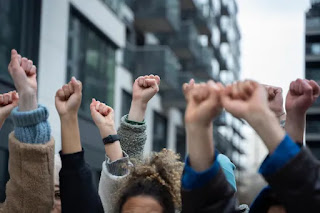by Ally McLaren
The world was in shock when, one year ago, Roe v Wade was overturned in the US, jeopardising abortion rights for women across all 50 states. The sentiment here across the pond was very much ‘well, at least it isn’t happening here in the UK. We’re much more progressive than that’.
Cut to June 2023, where a 44-year-old mother of three has been sentenced to 28 months in prison in the UK for inducing an abortion after the legal limit. This controversial case has shocked the nation, with many surprised at how flimsy our abortion laws were to begin with, and demanding that calls for reform are heard.
So what are the abortion rights in the UK?
The UK’s abortion law is an ancient 162 years old, part of the 1861 Offences Against the Person Act, which states that anyone who performs an abortion is guilty of a crime. Yet women in the UK can access free and safe abortions due to the Abortion Act of 1967. Under this act, abortion is legal before 24 weeks if performed by a registered medical practitioner at an authorised facility, if specific criteria are met, and if the procedure has been authorised by two doctors.
So while women CAN access abortions, they are not completely legal; the law is still archaic and abortions are not fully protected by it. This means that women in the UK can be imprisoned for having an abortion, as has been proven with this latest shocking case.
Why are women still being imprisoned for abortions?
The woman in this case pleaded guilty under the Offences Against the Person Act and was charged with child destruction under the Infant Life (Preservation) Act at Stoke Crown Court, facing a maximum penalty of life in prison. She has been sentenced to 28 months and an appeal against her sentence has been rejected.
She admitted to taking abortion pills in 2020 during lockdown, obtaining them under the government’s ‘pills by post’ service, which was introduced during the pandemic. This service allows the termination of pregnancies up to 10 weeks, yet she was 32 to 34 weeks pregnant at the time, which is past the legal limit.
With opinions divided, a public debate on the outdated abortion laws in this country has sparked demands for urgent reform.Women's rights activists and political leaders have been calling for parliament to revise the outdated laws, with the Women’s Equality Party holding a March in London on the 17th June at the Royal Courts of Justice, finishing at Westminster, calling for a full decriminalisation of abortion.
A statement by the party said: "I think that everybody can agree that what happened in this case is tragic, but all that the intervention of the criminal justice system has done here is make it even more tragic. Criminalisation doesn't prevent women in crisis breaking the rules, it doesn't even reduce the number of abortions. All it does is deter women from seeking healthcare when they need it, and generate cruel verdicts like this.
"It serves absolutely no one to lock this woman up for years, or to separate three children from their mother. She was sentenced under a law that was written before women even had the right to vote - it’s long since time we brought it into the 21st century.”
What is the future of abortion rights in the UK?
The overturning of Roe Wade acted as a catalyst for the discussion of abortion rights across the globe, with fears that the UK could be next to backpedal. Until abortions are protected under UK law, the right to them is not safe and access could be restricted in the future.
The Supreme Court overturning Roe v Wade granted states the power to make their own laws on abortion, reversing a 1973 court ruling that entitled women to an abortion during the first three months of their pregnancy. With this overturning, states can ban abortions earlier than 12 weeks, making it illegal in individual states. Since the decision on June 24 of last year, at least 15 states have stopped nearly all abortion services.
In England, MPs have voted to allow people to continue accessing abortion pills at home through the ‘pills by post’ service, following concerns that the removal of this service could increase late abortions. The amendment to retain the at-home service was added to the government’s Health and Care Bill by the House of Lords.
The fact that in 2023, women’s health, fertility rights and body autonomy are up for debate and could be taken away at any moment is absolutely terrifying. Seeing what happened in the US, knowing that our rights in the UK are not safe either, is like watching a ticking time bomb and praying it doesn’t go off.
We have rights to our bodies, and it is not up to debate. Abortion is healthcare, and healthcare is a basic human right.
This court case, taking a mother away from her three children over abortion, is just further proof that these rules care more about unborn children than they do about the mothers carrying them or existing children. It is all about control, and I for one am terrified that even the privileged, western world we live in could go back to Victorian laws that give women absolutely no agency or control over their reproductive rights.
No matter what you think about this case, the bigger picture is that abortion in the UK needs to be made legal, for the security of our future.


